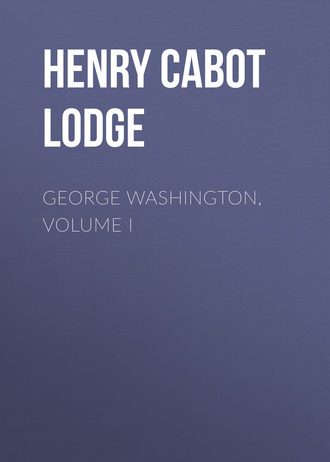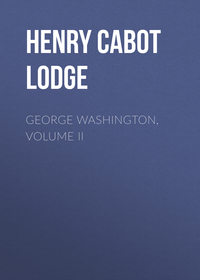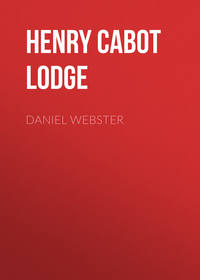 полная версия
полная версияGeorge Washington, Volume I
Meantime, while the internal difficulties were slowly diminished, the forces of the enemy rapidly increased. First it became evident that attacks were not feasible. Then the question changed to a mere choice of defenses. Even as to this there was great and harassing doubt, for the enemy, having command of the water, could concentrate and attack at any point they pleased. Moreover, the British had thirty thousand of the best disciplined and best equipped troops that Europe could furnish, while Washington had some twenty thousand men, one fourth of whom were unfit for duty, and with the remaining three fourths, raw recruits for the most part, he was obliged to defend an extended line of posts, without cavalry, and with no means for rapid concentration. Had he been governed solely by military considerations he would have removed the inhabitants, burned New York, and drawing his forces together would have taken up a secure post of observation. To have destroyed the town, however, not only would have frightened the timid and the doubters, and driven them over to the Tories, but would have dispirited the patriots not yet alive to the exigencies of war, and deeply injured the American cause. That Washington well understood the need of such action is clear, both from the current rumors that the town was to be burned, and from his expressed desire to remove the women and children from New York. But political considerations overruled the military necessity, and he spared the town. It was bad enough to be thus hampered, but he was even more fettered in other ways, for he could not even concentrate his forces and withdraw to the Highlands without a battle, as he was obliged to fight in order to sustain public feeling, and thus he was driven on to almost sure defeat. With Brooklyn Heights in the hands of the enemy New York was untenable, and yet it was obvious that to hold Brooklyn when the enemy controlled the sea was inviting defeat. Yet Washington under the existing conditions had no choice except to fight on Long Island and to say that he hoped to make a good defense.
Everything, too, as the day of battle drew near, seemed to make against him. On August 22 the enemy began to land on Long Island, where Greene had drawn a strong line of redoubts behind the village of Brooklyn, to defend the heights which commanded New York, and had made every arrangement to protect the three roads through the wooded hills, about a mile from the intrenchments. Most unfortunately, and just at the critical moment, Greene was taken down with a raging fever, so that when Washington came over on the 24th he found much confusion in the camps, which he repressed as best he could, and then prepared for the attack. Greene's illness, however, had caused some oversights which were unknown to the commander-in-chief, and which, as it turned out, proved fatal.
After indecisive skirmishing for two or three days, the British started early on the morning of the 26th. They had nine thousand men and were well informed as to the country. Advancing through woodpaths and lanes, they came round to the left flank of the Americans. One of the roads through the hills was unguarded, the others feebly protected. The result is soon told. The Americans, out-generaled and out-flanked, were taken by surprise and surrounded, Sullivan and his division were cut off, and then Lord Stirling. There was some desperate fighting, and the Americans showed plenty of courage, but only a few forced their way out. Most of them were killed or taken prisoners, the total loss out of some five thousand men reaching as high as two thousand.
From the redoubts, whither he had come at the sound of the firing, Washington watched the slaughter and disaster in grim silence. He saw the British troops, flushed with victory, press on to the very edge of his works and then withdraw in obedience to command. The British generals had their prey so surely, as they believed, that they mercifully decided not to waste life unnecessarily by storming the works in the first glow of success. So they waited during that night and the two following days, while Washington strengthened his intrenchments, brought over reinforcements, and prepared for the worst. On the 29th it became apparent that there was a movement in the fleet, and that arrangements were being made to take the Americans in the rear and wholly cut them off. It was an obvious and sensible plan, but the British overlooked the fact that while they were lingering, summing up their victory, and counting the future as assured, there was a silent watchful man on the other side of the redoubts who for forty-eight hours never left the lines, and who with a great capacity for stubborn fighting could move, when the stress came, with the celerity and stealth of a panther.
Washington swiftly determined to retreat. It was a desperate undertaking, and a lesser man would have hesitated and been lost. He had to transport nine thousand men across a strait of strong tides and currents, and three quarters of a mile in width. It was necessary to collect the boats from a distance, and do it all within sight and hearing of the enemy. The boats were obtained, a thick mist settled down on sea and land, the water was calm, and as the night wore away, the entire army with all its arms and baggage was carried over, Washington leaving in the last boat. At daybreak the British awoke, but it was too late. They had fought a successful battle, they had had the American army in their grasp, and now all was over. The victory had melted away, and, as a grand result, they had a few hundred prisoners, a stray boat with three camp-followers, and the deserted works in which they stood. To grasp so surely the happy chance of wind and weather and make such a retreat as this was a feat of arms as great as most victories, and in it we see, perhaps as plainly as anywhere, the nerve and quickness of the man who conducted it. It is true, it was the only chance of salvation, but the great man is he who is entirely master of his opportunity, even if he have but one.
The outlook, nevertheless, was, as Washington wrote, "truly distressing." The troops were dispirited, and the militia began to disappear, as they always did after a defeat. Congress would not permit the destruction of the city, different interests pulled in different directions, conflicting opinions distracted the councils of war, and, with utter inability to predict the enemy's movements, everything led to halfway measures and to intense anxiety, while Lord Howe tried to negotiate with Congress, and the Americans waited for events. Washington, looking beyond the confusion of the moment, saw that he had gained much by delay, and had his own plan well defined. He wrote: "We have not only delayed the operations of the campaign till it is too late to effect any capital incursion into the country, but have drawn the enemy's forces to one point.... It would be presumption to draw out our young troops into open ground against their superiors both in number and discipline, and I have never spared the spade and pickaxe." Every one else, however, saw only past defeat and present peril.
The British ships gradually made their way up the river, until it became apparent that they intended to surround and cut off the American army. Washington made preparations to withdraw, but uncertainty of information came near rendering his precautions futile. September 15 the men-of-war opened fire, and troops were landed near Kip's Bay. The militia in the breastworks at that point had been at Brooklyn and gave way at once, communicating their panic to two Connecticut regiments. Washington, galloping down to the scene of battle, came upon the disordered and flying troops. He dashed in among them, conjuring them to stop, but even while he was trying to rally them they broke again on the appearance of some sixty or seventy of the enemy, and ran in all directions. In a tempest of anger Washington drew his pistols, struck the fugitives with his sword, and was only forced from the field by one of his officers seizing the bridle of his horse and dragging him away from the British, now within a hundred yards of the spot.
Through all his trials and anxieties Washington always showed the broadest and most generous sympathy. When the militia had begun to leave him a few days before, although he despised their action and protested bitterly to Congress against their employment, yet in his letters he displayed a keen appreciation of their feelings, and saw plainly every palliation and excuse. But there was one thing which he could never appreciate nor realize. It was from first to last impossible for him to understand how any man could refuse to fight, or could think of running away. When he beheld rout and cowardly panic before his very eyes, his temper broke loose and ran uncontrolled. His one thought then was to fight to the last, and he would have thrown himself single-handed on the enemy, with all his wisdom and prudence flung to the winds. The day when the commander held his place merely by virtue of personal prowess lay far back in the centuries, and no one knew it better than Washington. But the old fighting spirit awoke within him when the clash of arms sounded in his ears, and though we may know the general in the tent and in the council, we can only know the man when he breaks out from all rules and customs, and shows the rage of battle, and the indomitable eagerness for the fray, which lie at the bottom of the tenacity and courage that carried the war for independence to a triumphant close.
The rout and panic over, Washington quickly turned to deal with the pressing danger. With coolness and quickness he issued his orders, and succeeded in getting his army off, Putnam's division escaping most narrowly. He then took post at King's Bridge, and began to strengthen and fortify his lines. While thus engaged, the enemy advanced, and on the 16th Washington suddenly took the offensive and attacked the British light troops. The result was a sharp skirmish, in which the British were driven back with serious loss, and great bravery was shown by the Connecticut and Virginia troops, the two commanding officers being killed. This affair, which was the first gleam of success, encouraged the troops, and was turned to the best account by the general. Still a successful skirmish did not touch the essential difficulties of the situation, which then as always came from within, rather than without. To face and check twenty-five thousand well-equipped and highly disciplined soldiers Washington had now some twelve thousand men, lacking in everything which goes to make an army, except mere individual courage and a high average of intelligence. Even this meagre force was an inconstant and diminishing quantity, shifting, uncertain, and always threatening dissolution.
The task of facing and fighting the enemy was enough for the ablest of men; but Washington was obliged also to combat and overcome the inertness and dullness born of ignorance, and to teach Congress how to govern a nation at war. In the hours "allotted to sleep," he sat in his headquarters, writing a letter, with "blots and scratches," which told Congress with the utmost precision and vigor just what was needed. It was but one of a long series of similar letters, written with unconquerable patience and with unwearied iteration, lighted here and there by flashes of deep and angry feeling, which would finally strike home under the pressure of defeat, and bring the patriots of the legislature to sudden action, always incomplete, but still action of some sort. It must have been inexpressibly dreary work, but quite as much was due to those letters as to the battles. Thinking for other people, and teaching them what to do, is at best an ungrateful duty, but when it is done while an enemy is at your throat, it shows a grim tenacity of purpose which is well worth consideration.
In this instance the letter of September 24, read in the light of the battles of Long Island and Kip's Bay, had a considerable effect. The first steps were taken to make the army national and permanent, to raise the pay of officers, and to lengthen enlistments. Like most of the war measures of Congress, they were too late for the immediate necessity, but they helped the future. Congress, moreover, then felt that all had been done that could be demanded, and relapsed once more into confidence. "The British force," said John Adams, chairman of the board of war, "is so divided, they will do no great matter this fall." But Washington, facing hard facts, wrote to Congress with his unsparing truth on October 4: "Give me leave to say, sir, (I say it with due deference and respect, and my knowledge of the facts, added to the importance of the cause and the stake I hold in it, must justify the freedom,) that your affairs are in a more unpromising way than you seem to apprehend. Your army, as I mentioned in my last, is on the eve of its political dissolution. True it is, you have voted a larger one in lieu of it; but the season is late; and there is a material difference between voting battalions and raising men."
The campaign as seen from the board of war and from the Plains of Harlem differed widely. It is needless to say now which was correct; every one knows that the General was right and Congress wrong, but being in the right did not help Washington, nor did he take petty pleasure in being able to say, "I told you how it would be." The hard facts remained unchanged. There was the wholly patriotic but slumberous, and for fighting purposes quite inefficient Congress still to be waked up and kept awake, and to be instructed. With painful and plain-spoken repetition this work was grappled with and done methodically, and like all else as effectively as was possible.
Meanwhile the days slipped along, and Washington waited on the Harlem Plains, planning descents on Long Island, and determining to make a desperate stand where he was, unless the situation decidedly changed. Then the situation did change, as neither he nor any one else apparently had anticipated. The British warships came up the Hudson past the forts, brushing aside our boasted obstructions, destroying our little fleet, and getting command of the river. Then General Howe landed at Frog's Point, where he was checked for the moment by the good disposition of Heath, under Washington's direction. These two events made it evident that the situation of the American army was full of peril, and that retreat was again necessary. Such certainly was the conclusion of the council of war, on the 16th, acting this time in agreement with their chief. Six days Howe lingered on Frog's Point, bringing up stores or artillery or something; it matters little now why he tarried. Suffice it that he waited, and gave six days to his opponent. They were of little value to Howe, but they were of inestimable worth to Washington, who employed them in getting everything in readiness, in holding his council of war, and then on the 17th in moving deliberately off to very strong ground at White Plains. On his way he fought two or three slight, sharp, and successful skirmishes with the British. Sir William followed closely, but with much caution, having now a dull glimmer in his mind that at the head of the raw troops in front of him was a man with whom it was not safe to be entirely careless.
On the 28th, Howe came up to Washington's position, and found the Americans quite equal in numbers, strongly intrenched, and awaiting his attack with confidence. He hesitated, doubted, and finally feeling that he must do something, sent four thousand men to storm Chatterton Hill, an outlying post, where some fourteen hundred Americans were stationed. There was a short, sharp action, and then the Americans retreated in good order to the main army, having lost less than half as many men as their opponents. With caution now much enlarged, Howe sent for reinforcements, and waited two days. The third day it rained, and on the fourth Howe found that Washington had withdrawn to a higher and quite impregnable line of hills, where he held all the passes in the rear and awaited a second attack. Howe contemplated the situation for two or three days longer, and then broke camp and withdrew to Dobbs Ferry to secure Fort Washington, which treachery offered him as an easy and inviting prize. Such were the great results of the victory of Long Island, two wasted months, and the American army still untouched.
Howe was resolved that his campaign should not be utterly fruitless, and therefore directed his attention to the defenses of the Hudson, and here he met with better success. Congress, in its military wisdom, had insisted that these forts must and could be held. So thought the generals, and so most especially, and most unluckily, did Greene. Washington, with his usual accurate and keen perception, saw, from the time the men-of-war came up the Hudson, and, now that the British army was free, more clearly than ever, that both forts ought to be abandoned. Sure of his ground, he overruled Congress, but was so far influenced by Greene that he gave to that officer discretionary orders as to withdrawal. This was an act of weakness, as he afterwards admitted, for which he bitterly reproached himself, never confusing or glossing over his own errors, but loyal there, as elsewhere, to facts. An attempt was made to hold both forts, and both were lost, as he had foreseen. From Fort Lee the garrison withdrew in safety. Fort Washington, with its plans all in Howe's hands through the treachery of William Demont, the adjutant of Colonel Magaw, was carried by storm, after a severe struggle. Twenty-six hundred men and all the munitions of war fell into the hands of the enemy. It was a serious and most depressing loss, and was felt throughout the continent.
Meantime Washington had crossed info the Jerseys, and, after the loss of Fort Lee, began to retreat before the British, who, flushed with victory, now advanced rapidly under Lord Cornwallis. The crisis of his fate and of the Revolution was upon him. His army was melting away. The militia had almost all disappeared, and regiments whose term of enlistment had expired were departing daily. Lee, who had a division under his command, was ordered to come up, but paid no attention, although the orders were repeated almost every day for a month. He lingered, and loitered, and excused himself, and at last was taken prisoner. This disposed of him for a time very satisfactorily, but meanwhile he had succeeded in keeping his troops from Washington, which was a most serious misfortune.
On December 2 Washington was at Princeton with three thousand ragged men, and the British close upon his heels. They had him now surely in their grip. There could be no mistake this time, and there was therefore no need of a forced march. But they had not yet learned that to Washington even hours meant much, and when, after duly resting, they reached the Delaware, they found the Americans on the other side, and all the boats destroyed for a distance of seventy miles.
It was winter now, the short gray days had come, and with them piercing cold and storms of sleet and ice. It seemed as if the elements alone would finally disperse the feeble body of men still gathered about the commander-in-chief. Congress had sent him blank commissions and orders to recruit, which were well meant, but were not practically of much value. As Glendower could call spirits from the vasty deep, so they, with like success, sought to call soldiers from the earth in the midst of defeat, and in the teeth of a North American winter. Washington, baffling pursuit and flying from town to town, left nothing undone. North and south went letters and appeals for men, money, and supplies. Vain, very vain, it all was, for the most part, but still it was done in a tenacious spirit. Lee would not come, the Jersey militia would not turn out, thousands began to accept Howe's amnesty, and signs of wavering were apparent in some of the Middle States. Philadelphia was threatened, Newport was in the hands of the enemy, and for ninety miles Washington had retreated, evading ruin again and again only by the width of a river. Congress voted not to leave Philadelphia,—a fact which their General declined to publish,—and then fled.
No one remained to face the grim realities of the time but Washington, and he met them unmoved. Not a moment passed that he did not seek in some way to effect something. Not an hour went by that he did not turn calmly from fresh and ever renewed disappointment to work and action.
By the middle of December Howe felt satisfied that the American army would soon dissolve, and leaving strong detachments in various posts he withdrew to New York. His premises were sound, and his conclusions logical, but he made his usual mistake of overlooking and underestimating the American general. No sooner was it known that he was on his way to New York than Washington, at the head of his dissolving army, resolved to take the offensive and strike an outlying post. In a letter of December 14, the day after Howe began to move, we catch the first glimpse of Trenton. It was a bold spirit which, in the dead of winter, with a broken army, no prospect of reinforcements, and in the midst of a terror-stricken people, could thus resolve with some four thousand men to attack an army thoroughly appointed, and numbering in all its divisions twenty-five thousand soldiers.
It is well to pause a moment and look at that situation, and at the overwhelming difficulties which hemmed it in, and then try to realize what manner of man he was who rose superior to it, and conquered it. Be it remembered, too, that he never deceived himself, and never for one instant disguised the truth. Two years later he wrote that at this supreme moment, in what were called "the dark days of America," he was never despondent; and this was true enough, for despair was not in his nature. But no delusions lent him courage. On the 18th he wrote to his brother "that if every nerve was not strained to recruit this new army the game was pretty nearly up;" and added, "You can form no idea of the perplexity of my situation. No man, I believe, ever had a greater choice of difficulties, and less means to extricate himself from them. However, under a full persuasion of the justice of our cause, I cannot entertain an idea that it will finally sink, though it may remain for some time under a cloud." There is no complaint, no boasting, no despair in this letter. We can detect a bitterness in the references to Congress and to Lee, but the tone of the letter is as calm as a May morning, and it concludes with sending love and good wishes to the writer's sister and her family.
Thus in the dreary winter Washington was planning and devising and sending hither and thither for men, and never ceased through it all to write urgent and ever sharper letters and keep a wary eye upon the future. He not only wrote strongly, but he pledged his own estate and exceeded his powers in desperate efforts to raise money and men. On the 20th he wrote to Congress: "It may be thought that I am going a good deal out of the line of my duty to adopt these measures, or to advise thus freely. A character to lose, an estate to forfeit, the inestimable blessings of liberty at stake, and a life devoted, must be my excuse." Even now across the century these words come with a grave solemnity to our ears, and we can feel as he felt when he alone saw that he stood on the brink of a great crisis. It is an awful thing to know that the life of a nation is at stake, and this thought throbs in his words, measured and quiet as usual, but deeply fraught with much meaning to him and to the world.
By Christmas all was ready, and when the Christian world was rejoicing and feasting, and the British officers in New York and in the New Jersey towns were reveling and laughing, Washington prepared to strike. His whole force, broken into various detachments, was less than six thousand men. To each division was assigned, with provident forethought, its exact part. Nothing was overlooked, nothing omitted; and then every division commander failed, for good reason or bad, to do his duty. Gates was to march from Bristol with two thousand men, Ewing was to cross at Trenton, Putnam was to come up from Philadelphia, Griffin was to make a diversion against Donop. When the moment came, Gates, disapproving the scheme, was on his way to Congress, and Wilkinson, with his message, found his way to headquarters by following the bloody tracks of the barefooted soldiers. Griffin abandoned New Jersey and fled before Donop. Putnam would not even attempt to leave Philadelphia, and Ewing made no effort to cross at Trenton. Cadwalader, indeed, came down from Bristol, but after looking at the river and the floating ice, gave it up as desperate.





